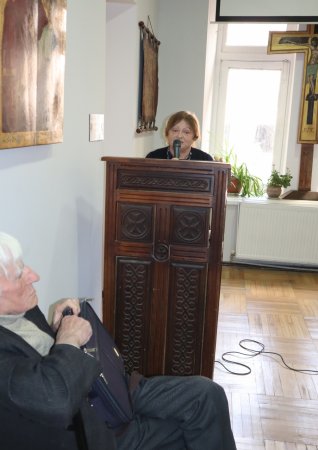At Tbilisi Theological Academy
and Seminary, traditionally, every Monday, representatives of
departments - professors and teachers - present very interesting,
informative and thematically diverse speeches to a wide audience.
Today, on February 13, the members of the Department of Georgian
Language and Literature - Doctor of Philology Professor Lela
Khachidze, and Doctor of Philology Professor Khvtiso Zaridze gave
their talks.
The topic of Mrs. Lela
Khachidze’s speech was the Lenten Triodion by Saint Giorgi the
Athonite. It is a noteworthy fact that, for the first time, the
work of the greatest representative of the Apostolic Church of
Georgia and Georgian culture, academically determined, according to
the seven most important Georgian manuscripts of the 11th- 15th
centuries, the text of the unique liturgical-hymnographic
collection the Lenten Triodion was translated and edited by Saint
Giorgi the Athonite. The collection contains Georgian translations
of numerous hymns intended for Great Lent by prominent
representatives, glorious saints of the Christian Church, which
were translated from Greek by Saint Giorgi the Athonite or were
edited by him. Another collection of similar completeness cannot be
found in the Greek Lenten Triodions known today. In the same
collection, more than 100 hymns of the great Georgian hymnographer
of the 10th century Ioane Minchkhi are preserved. Saint Giorgi the
Athonite’s edition presents a rich treasury of Christian poetry.
This magnificent creation has imprinted an indelible mark in the
history of Christian writing. These hymns are perfect examples of
theology, liturgy and spirituality in general. The following words
of the lawgiver of our Church Saint Giorgi the Athonite confirm
that “Neither among the Greeks, nor among the Georgian writings can
be found its equal.”
It has been more than four
decades since Professor Lela Khachidze, Head of the Department of
Georgian Language and Literature of the Theological Academy,
started studying this unique collection and published many studies
about it. The book was published in 2022 and dedicated to the 90th
birthday of His Holiness and Beatitude,
Catholicos-Patriarch of All
Georgia, Ilia II. The book was printed with the support of the
Research Center of Kartvelology of the Patriarchate of Georgia.
Mrs. Lela noted with great gratitude that the support and help of
Protopresbyter Giorgi Zviadadze, Doctor of Theology, Philology and
Political Sciences, was very important to her while working on the
paper. Doctor of Philological Sciences, Professor Khvtiso Zaridze
read a report entitled, “The Martyrdom of St. Eustathius of
Mtskheta” – “The Blessed Eustathius laughed...”
The scientist spoke extensively
about the canon of hagiographic genre, similarities and
peculiarities of Georgian and Byzantine hagiography. He noted that
the first works of hagiographic literature were created in the
Byzantine-Roman Christian environment (the 1st-4th centuries) and
from there gradually spread to the rest of the Christian world,
including Georgia. The origins of Byzantine and Georgian
hagiography were different. The reason for the emergence of
Georgian literary works dedicated to the martyrdom of Christians
was not the country’s internal political and religious conflict,
but the devotion and bravery shown in the battles against the
Persians and Muslims for the protection of national and religious
interests.
Mr. Khvtiso presented the
features that distinguish Georgian works on martyrdom from the
Byzantine writings of the corresponding era and genre, based on the
6th century anonymous author, “The Martyrdom of Saint Eustathius of
Mtskheta”. The work of the conference was summarized by the Rector
of Tbilisi Theological Academy and Seminary, Protopresbyter Giorgi
Zviadadze. He cordially thanked the speakers for their important
scientific research and teaching activities.


